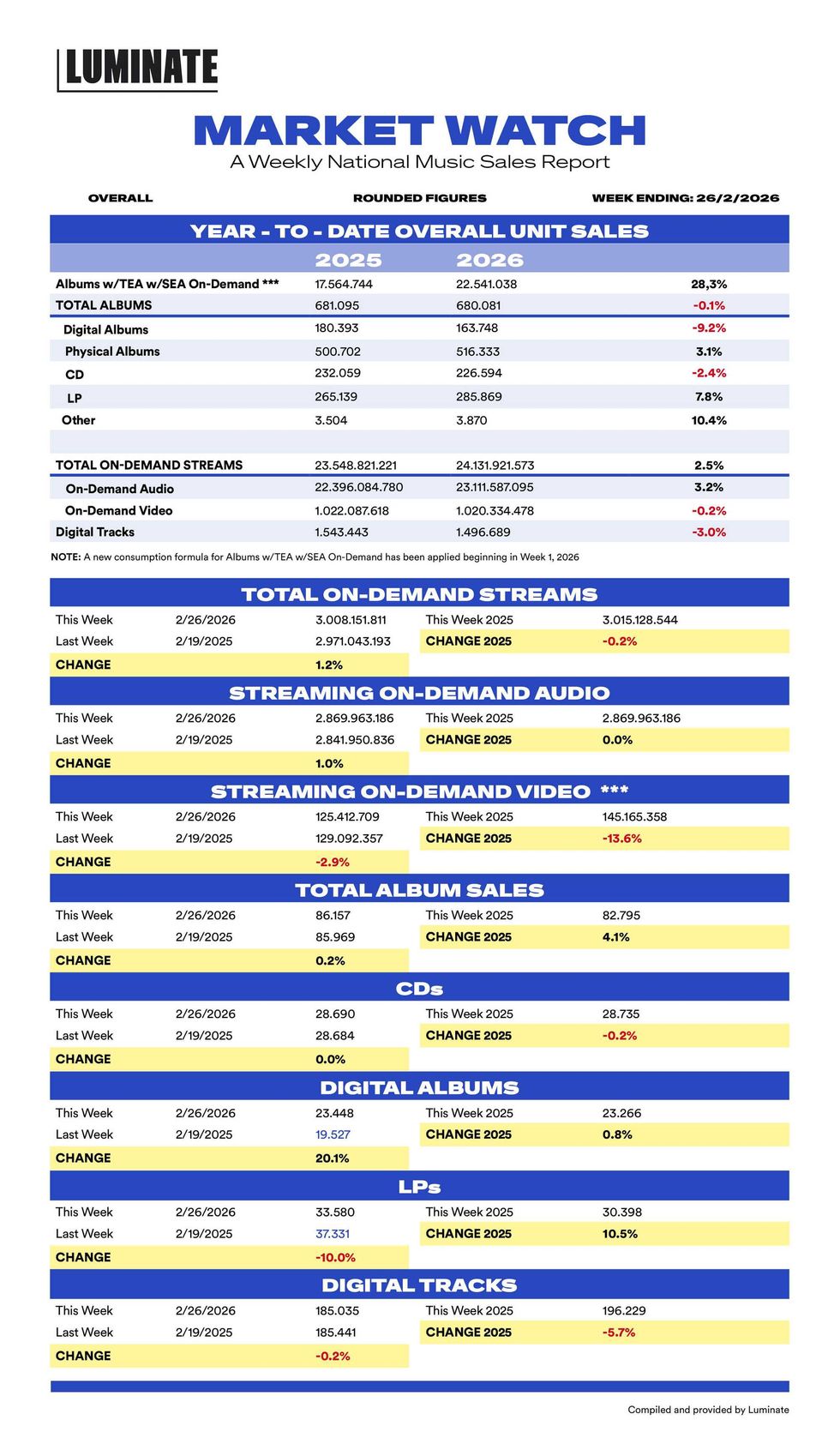Canadian Music Stakeholders Debate "Once-In-a-Generation" Update To CanCon Regulations
Organizations like Spotify, Music Canada and CIMA have been speaking at hearings around Bill C-11, the Online Streaming Act, which will update Canada's media policy for the first time in decades.
For the last few weeks, a who’s who of stakeholders in Canadian music and media have been appearing before the Canadian Radio-television and Telecommunications Commission (CRTC) — from rights manager SOCAN to Spotify, SiriusXM, FACTOR, the Canadian Live Music Association and even UFC. The occasion is Bill C-11, now passed into law the Online Streaming Act, which will update Canada’s Broadcasting Act for the first time in decades.
It’s a major deal for Canada's music industry, whose system of CanCon requirements and public funds have built an industry that can compete — or at least not crumble — in a market dominated by American media to the south. At stake for this first round of hearings, which wrap up on Dec. 8, are major streaming platforms like Spotify and YouTube and potential monetary contributions they may have to make to continue to operate in Canada. Later phases will cover Canadian Content requirements and how the act will be implemented.
“We hope that the CRTC will lean into this idea that it's a once-in-a-generation regulatory process,” Patrick Rogers, CEO of Music Canada (the trade organization that represents Canada's major labels), tells Billboard Canada. “[In phase one] there are a lot of big questions: Who gets regulated? Who pays? How much? Who has access to the money? Now is when we’re going to figure it out.”
Possible Repercussions
One worry among some stakeholders is that too much financial regulation of big American tech companies could cause them to scale back their investment in Canada. Something similar recently happened with Bill C-18, in which Meta chose to block all Canadian news rather than pay to keep running it on platforms like Facebook. (The government recently narrowly avoided a similar fate with Google, who agreed to a reported $100 million deal to avoid a news ban on the platform.)
In last week’s hearings, on Nov. 29, representatives from Spotify, which operates in Canada and has an office in Toronto, said that compelled spending could affect their existing Canadian investments.
“If asked to make a burdensome contribution, irrespective of our existing investments, Spotify will need to make financial decisions to sustainably run our business,” said Olivia Regnier, Senior Director of Public Policy for Spotify.
“Additional costs could require us to cut expenses, including [reducing] our resources for editorial, partnership, and promotional programs in Canada; reduce resources currently going back to the music ecosystem; or force us to raise prices for Canadian consumers,” she continued. “All of these effects would ultimately negatively impact Canadian and Indigenous artists, Canadian consumers and the entire Canadian music ecosystem – and it would undermine the very objectives of the broadcasting policy.”
Since that deputation, Spotify has cut 17% of its global workforce, about 1,500 jobs, citing "the gap between our financial goal state and our current operational costs."
Music Canada’s Rogers cautions the CRTC not to simply take the system of CanCon and its funding system over the decades at radio and port it over to new online services. (Watch his presentation here.)
“I think we can be proud of the terrestrial regulations of the past without trying to apply them to streaming,” he tells Billboard Canada. “Radio and streaming aren't just a little different, they're the opposite in most cases. There's a finite number of hours of radio, regulated radio play. There's infinite hours of streaming… So we want to make sure that the regulations fit the business models, but also the user experience and what's best for artists.”
Rogers says he is pro-regulation, but that that “whatever contribution level is set [for streaming companies] gives precedent and value to the investments on the ground.” Companies like Spotify are not just American businesses swooping in to disrupt the Canadian market, he argues, but direct investors in promoting the country's artists on an international level.
“In order for Canadians to continue to be successful globally, we need [people from international labels and distributors] here,” he says.
Building On The Momentum of Canadian Music
Andrew Cash, President and CEO of the Canadian Independent Music Association (CIMA), emphasizes the bill’s potential effect on working musicians and homegrown music companies and labels. That includes a diverse and multicultural music scene, which means understanding and supporting underrepresented communities including Indigenous artists.
“The objective here should be: how do we build a stable, viable, resilient, equitable, middle class of artists and thriving Canadian-owned businesses that can compete globally?” he tells Billboard Canada.
The current infrastructure was created over decades, he argues, and it's just starting to build momentum for Canadian talent now. Rather than look at the “platformization of music” on streaming services like Apple Music, YouTube and Spotify as a threat, he says, the CRTC should look at it as a “massive opportunity for Canadian artists that we’ve never had before.”
At the same time this discussion is happening, he says, major Canadian music grants like FACTOR and Radio Starmaker are seeing their contributions from terrestrial radio go down. In her presentation, FACTOR President Meg Symsyk said Canadian Content Development (CCD) contributions from private radio broadcasters have gone down $10 million over the last four years, which limits the amount of funding they can distribute to Canadian artists.
On the public side, initiatives like the Canada Music Fund – which he's previously urged the federal government to increase – are also underfunded by government, Cash argues, especially as emergency pandemic top-ups will run out at the end of 2024. “So what we’re seeing right now is instability on both sides of the funding system.”
Rather than create new funds, which might delay flow of resources and cost money to create, Cash would like to see them bolster existing and proven funds like FACTOR and Quebec’s Musicaction.
Some commentators, such as University of Ottawa professor Michael Geist, have cautioned that many of the stakeholders appearing at the hearings would be representing their own interests over the public's and treating the opportunity as a "cash grab."
While it's true that some of the speakers have been self-interested, Cash says the music sector is united in one key way.
“C-11 really started as an audio-visual bill,” says Cash. “It was really about film and TV and services like Netflix. That’s what a lot of the conversation is centred on, and the music sector sometimes gets thrown is an afterthought. I think what we’re all trying to do here – whether it’s Music Canada or CIMA or SOCAN or any of these organizations – is to say music represents a success story. That needs to be acknowledged, and then we need to build on that success.”
The CRTC has a full list of speakers and links to their proposals and presentations here.
- CIMA Calls On Government To Keep Canada Music Fund Promise | Billboard Canada ›
- CIMA Calls On Government To Keep Canada Music Fund Promise | Billboard Canada ›
- Spotify Raising Prices in Canada While Challenging Proposed 'Streaming Tax' | Billboard Canada ›
- Spotify augmente ses tarifs au Canada tout en contestant la « taxe sur le streaming » | Billboard Canada ›
- Canadian Music Industry Weighs in on How to Support Canadian Audio Content at CRTC Public Hearings | Billboard Canada ›
- L’industrie musicale canadienne s’exprime sur le soutien au contenu audio national lors des audiences publiques du CRTC | Billboard Canada ›



















